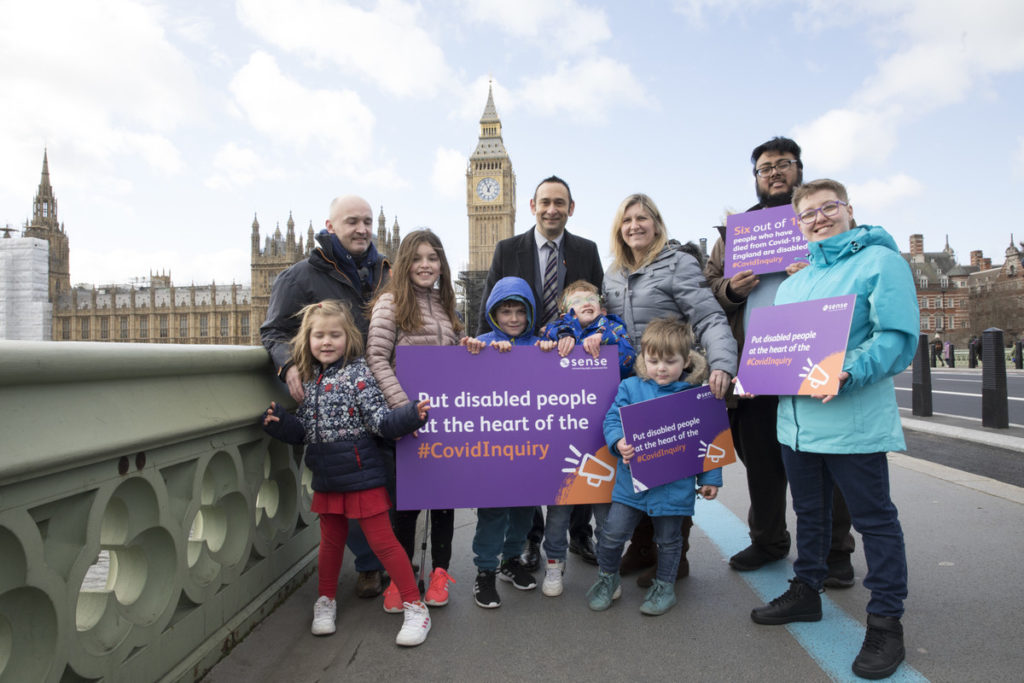Disabled people must be at the heart of next year’s Covid inquiry
Steven works on our campaigns and influences government so they better represent people with complex disabilities. He shares why the latest Sense campaign is so important to him.

Our latest Sense campaign calls for disabled people to be at the heart of next year’s public inquiry into the UK’s handling of Covid-19. You can add your name now.
As someone who works on the campaigns team at Sense, I’ve been asked why I feel so passionately that the experience of disabled people should be a focus of the inquiry, when so many people have been affected by the pandemic.
For me, the reason is clear – 6 out of 10 people in the UK who have died from Covid-19 are disabled, despite making up just 22 per cent of the population. Put simply, disabled people are one of the hardest hit groups of the pandemic.
Yes, the last 18 months have been incredibly tough for everyone, but the impact of the pandemic has been particularly severe for disabled people such as myself.
And yet, it hasn’t all been bad – and there could yet be a positive legacy.
It’s crucial that we have an opportunity to reflect and learn from this. The inquiry is that opportunity.
What’s a public inquiry?
Put simply, a public inquiry is a major investigation into a particular action or event, that focuses on looking at:
- What happened
- Why it happened and who was responsible
- What lessons can be learnt
Public inquiries are usually led by a chairperson or panel who review and collect evidence from different people. We don’t yet know what the Covid-19 inquiry will include, but we do know that it’s vital that the voices of disabled people and their families are heard and acted upon if we want to learn from what has happened.
The experience of disabled people during the pandemic
The pandemic has both worsened existing inequalities and exposed new problems that disabled people face. And throughout, disabled people and their families have said they’ve felt forgotten.
Right from the start there were problems. At a time of global crisis, disabled people were struggling to access important information.
To illustrate this, in August of this year, Katie Rowley, who is deaf, has recently won a claim against the government after a judge found a lack of sign language at two Covid briefings “served to disempower, to frustrate and to marginalise”.
Lockdown meant that many disabled people experienced difficulties accessing food and medical essentials.
Our Forgotten Families campaign highlighted the impact cuts to services had at the height of the pandemic, with many still wating for support to be reinstated.
Disabled children have been unable to return to school because the right support isn’t in place for their needs, and others have missed out on vital care they would usually get at school, like physiotherapy.
Our Left Out of Life campaign highlighted the soaring rates of loneliness among disabled people – made worse by Covid-19.
We must make sure that these experiences are investigated to ensure that disabled people’s needs are truly prioritised in future.
Moving to a more inclusive world
It hasn’t all been bad though.
We must recognise that some of the solutions to the pandemic have made life more inclusive for disabled people. It’s important to reflect on these, and ensure they not lost as we move beyond the pandemic.
The move to remote working over the last year has been welcomed by many (including myself!) For some, it’s opened opportunities like different job roles, reduced challenging commutes and balanced work and wellbeing.
Our online life has allowed people to take part in different social activities. Zoom quizzes and online gatherings have enabled friendships and networks from home. And we’ve seen an increase in the number of arts performances, plays and music gigs that can be viewed online.
We don’t want to lose the changes that have helped make the world more inclusive for disabled people.
If there are any positive legacies to come out of this awful time, it’s vital that these are examined in the inquiry. We must look at both sides to really learn.
Sign the petition
I’m calling for disabled people to be at the heart of the Covid-19 public inquiry. Together, let’s make sure the voice of disabled people and their families are heard.

